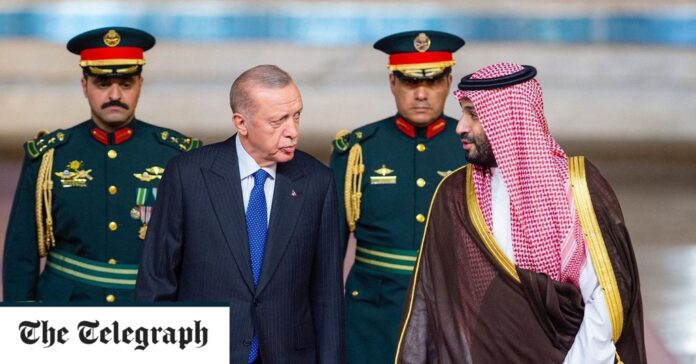No one should think that directionless drift in Joe Biden’s policy in the Middle East can do anything to discourage trouble-makers
Turkey’s veteran President, Recep Tayyip Erdogan, and Saudi Arabia’s still youthful Crown Prince, Mohammed bin Sultan (MbS) make an odd couple. Optimistic observers see this week’s meeting between the two in Jeddah as part of the Turkish president’s apparent tilt towards moderation since his re-election. Yes, he has appointed more orthodox economic advisers, backed Ukraine’s candidacy for Nato and even agreed to let Sweden into the alliance – but on conditions yet to be met.
In reality, those Western hopes amount to clutching at straws. The rapprochement between the Turkish and Saudi strongmen which started a year ago in the shadow of Russia’s invasion of Ukraine reflects their sense that Vladimir Putin’s brutal break with international norms against aggression was an opportunity for their two countries to break the chains of restraint hemming them in too. Despite Erdogan’s warm words for Ukraine’s entry into Nato, his invitation to Vladimir Putin to visit Turkey still stands. Turkey remains a key transport hub for both Russians travelling abroad.
The Saudi Crown Prince, too, has courted the Kremlin for years now. Russia has been accused of evading Western oil sanctions by selling it to the Saudis, presumably at a discounted rate. MBS’s ability to chart choppy waters since the dismembering of the Saudi dissident, Jamal Khashoggi inside the Saudi consulate in Istanbul in October, 2018, was testament to how far his vast oil reserves can calm consciences. Then, Erdogan pointed the finger of blame directly at the Saudis and released taped intercepts. But since last year, the tune has changed.
Erdogan’s capricious approach to foreign policy means he has reversed Turkey’s stance as the champion of “democracy” across the Middle East. Having thundered denunciations of the military coup in Egypt in 2013 which toppled Erdogan’s Muslim Brotherhood allies, now Ankara and Cairo are set to kiss-and-make-up too. Egypt’s dictator al-Sisi and the Saudi autocrat are not firm allies of the West like their predecessors were for decades. The Middle East’s major despots are now playing against US policy and interests. Both al-Sisi and MBS have courted Vladimir Putin, while not refusing American high-tech weaponry which Washington approves on autopilot.


